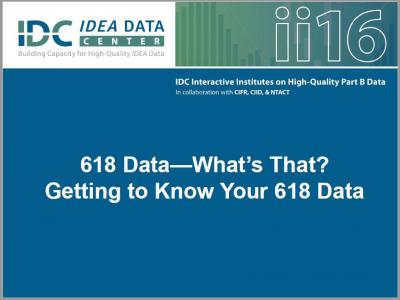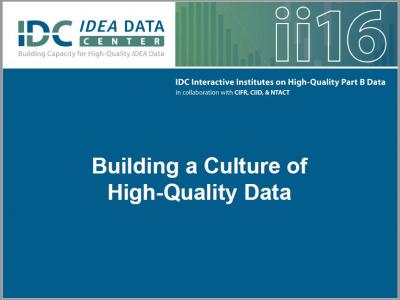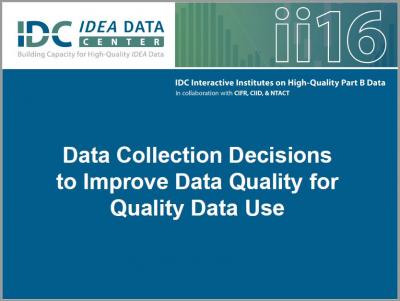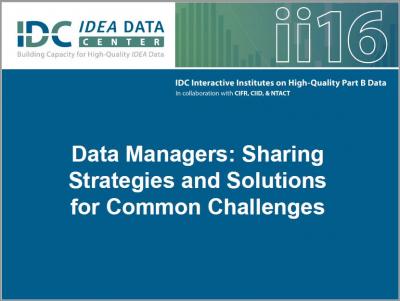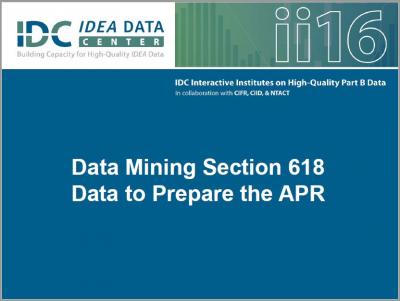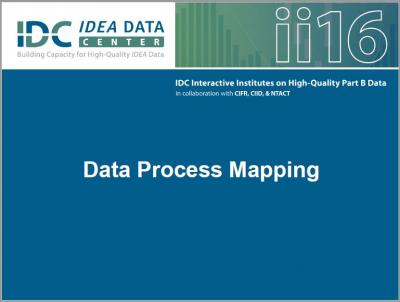Site Search
Results 1 - 7 of 25
Format: Presentations
618 Data—What’s That? Getting to Know Your 618 DataHave you heard these terms 618, 616, EDFacts, EMAPS, file specifications, OMB-MAX, GRADS360, Data Quality Reports? Do you understand what they are referencing? Do you want to gain a higher knowledge of these terms? Participants in this presentation learned more about IDEA data reporting requirements in relation to the 618 data collections. They also learned about data quality considerations and tools states can use when going through the data collecting and reporting procedures.
Format: Presentations
Building a Culture of High-Quality DataPanel participants included staff from the DQC and the Georgia Department of Education. DQC staff discussed the role of education data and the opportunity to go beyond compliance, the need for focusing on policy priorities, and new opportunities the Every Student Succeeds Act presents. Georgia Department of Education staff shared their story about how the state has built a culture of data use from state-level infrastructure development to getting the data into the hands of teachers who are using the data to have a positive impact on improving student results.
Format: Presentations
Collecting High-Quality Data: Why It Is ImportantThis presentation focused on what is meant by the term “data quality” and provided information regarding the importance of high-quality data in the collection, reporting, and use of data in local and state decision making. Presenters shared actual examples from state experiences.
Format: Presentations
Data Collection Decisions to Improve Data Quality for Quality Data UseThis presentation provided an overview of the challenges of data collection for IDEA Part B Indicator 14 and identified some successful efforts to overcome challenges such as representativeness and response rates. Additionally, presenters shared one state's effort to improve the quality of their student post-school outcome data to increase confidence in programmatic decisions that could be made from those data.
Format: Presentations
Data Managers: Sharing Strategies and Solutions for Common ChallengesThis role-alike presentation was a facilitated discussion by Part B Data Managers to explore strategies and solutions for meeting common challenges, such as working with LEAs to improve data quality, cross walking EDFacts data to SPP/APR indicators, and verifying that requirements for making data available to the public are fully met.
Format: Presentations
Data Mining Section 618 Data to Prepare the APRThe required measurements for APR Indicators B3, B4, B5, B6, B9, and B10 (the assessment, discipline, LRE, and disproportionality indicators) are based on Section 618 data. This session focused on selected section 618 data submissions and how the data can be explored to provide more in-depth information for use in discussion with state’s APR stakeholders. Presenters demonstrated some practical methods for taking a deeper look at data in the IDEA EDFacts file submissions using readily available data analysis tools (Microsoft Excel).
Format: Presentations
Data Process MappingDo you ever wonder what other states are doing to ensure high-quality data? Participants of this session learned about the work that the Kentucky Department of Education is undertaking to create data process protocols, build capacity of data stewards, and institute a culture of high-quality data. This work is being accomplished using the new IDC Data Processes Toolkit. Presenters provided an overview of the toolkit, and participants had an opportunity to experience “preparing for this work.”


